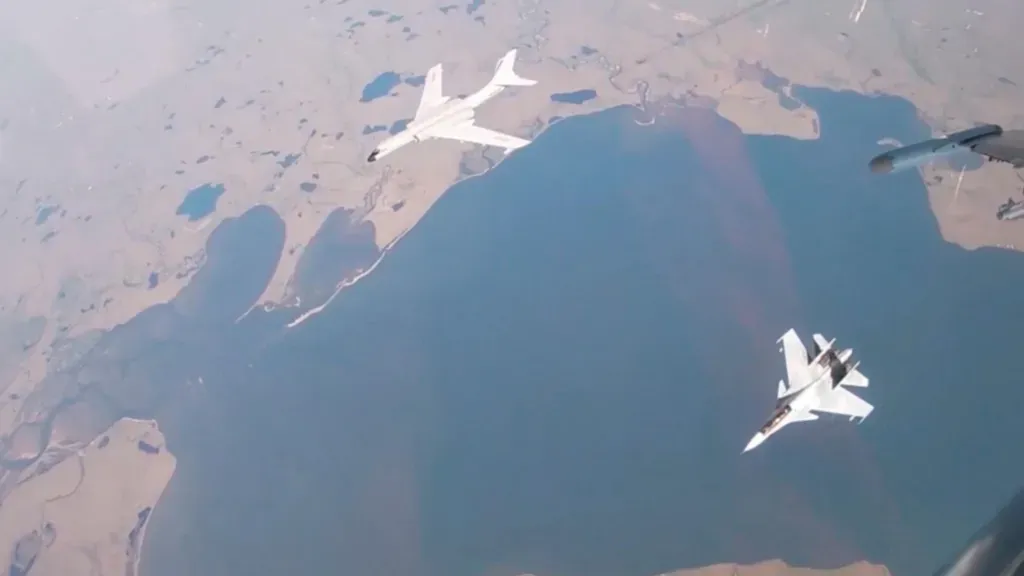In a significant display of military collaboration, China and Russia have executed their first joint bomber patrol over the North Pacific Ocean and the Bering Sea, notably near the coast of Alaska. This event marks a new phase in the strategic partnership between these two nations, raising concerns and prompting reactions from various stakeholders, including the United States and its allies.
Details of the Joint Bomber Patrol
The Nature of the Patrol
On Wednesday, Russian and Chinese military forces conducted a coordinated bomber patrol that brought together aircraft from both countries over international waters close to Alaska. This joint operation involved Russian Tu-95MS strategic missile carriers and Chinese Xian H-6 strategic bombers. While both countries have engaged in separate patrols in the region before, this is the first time they have conducted a combined operation in this particular area.
Reactions from the US-Canadian NORAD
The North American Aerospace Defense Command (NORAD) intercepted the bombers during their patrol. According to NORAD, the aircraft remained within international airspace and did not pose an immediate threat. The command noted that while the patrol was closely monitored, it did not result in any direct confrontation or violation of airspace boundaries.
Statements from Moscow and Beijing
Both Russia and China have characterized the joint patrol as routine and non-threatening. Moscow and Beijing have emphasized that the operation was “not aimed at any third party” and was intended to showcase their operational capabilities rather than provoke or intimidate other nations. Russian and Chinese officials have maintained that their military cooperation is focused on enhancing their strategic partnership rather than challenging the geopolitical status quo.
Reactions and Implications
US and Allied Reactions
Senator Lisa Murkowski’s Response
Alaska Senator Lisa Murkowski condemned the joint patrol as an “unprecedented provocation by our adversaries.” She highlighted that this was the first instance of Russian and Chinese bombers operating together in the region and expressed concerns about the potential implications for regional security. Murkowski’s reaction underscores the heightened sensitivity and vigilance regarding military activities near the US borders.
NATO’s Accusations and Concerns
The NATO alliance has recently voiced its concerns about the growing cooperation between China and Russia. At a summit in Washington earlier this month, NATO countries issued a joint statement accusing China of being a “decisive enabler” of Russia’s war efforts in Ukraine. The statement urged China to cease all material and political support for Russia, reflecting the ongoing tension between the West and the two authoritarian powers.
US Department of Defense Report
The US Department of Defense released a report on Arctic security that expressed apprehension about the increasing alignment between China and Russia. The report predicted that their military cooperation would continue to grow, particularly in the Arctic region. This forecast aligns with broader concerns about the strategic implications of enhanced Russian-Chinese ties and their potential impact on global security dynamics.
Kremlin’s Response
Kremlin spokesman Dmitry Peskov responded to these concerns by asserting that Russian-Chinese cooperation in the Arctic would contribute to an atmosphere of “stability and predictability.” Peskov’s remarks were intended to counter the narrative of growing military threat and emphasize the peaceful nature of the strategic partnership between Moscow and Beijing.
Strategic Context and Historical Background
Evolving Russia-China Relations
The relationship between Russia and China has evolved significantly since Russia’s invasion of Ukraine in February 2022. Western sanctions against Russia have prompted Moscow to seek deeper strategic and economic ties with Beijing. This collaboration has included joint military exercises, naval patrols, and other forms of bilateral cooperation. The recent joint bomber patrol reflects the growing military alignment between the two nations and their ability to project power collectively.
Previous Joint Military Activities
Before this joint bomber patrol, China and Russia had conducted several other joint military operations. Earlier this month, the two countries completed their fourth joint naval patrol in the northern and western Pacific Ocean. These activities have been part of a broader strategy to enhance their military cooperation and demonstrate their combined capabilities.
The Arctic Dimension
Strategic Importance of the Arctic
The Arctic region has become increasingly significant in global geopolitics, with melting ice opening new shipping routes and access to untapped natural resources. Both China and Russia have strategic interests in the Arctic, and their collaboration in the region has been a subject of international scrutiny. The joint bomber patrol near Alaska can be seen as part of their broader strategy to assert their presence and influence in the Arctic.
International Reactions to Arctic Cooperation
The growing Russian-Chinese alignment in the Arctic has raised concerns among Western nations about the potential military and economic implications. The US and its allies are particularly attentive to developments in the region due to its strategic importance and the potential for increased competition over resources and shipping routes.
Conclusion
The recent joint bomber patrol by China and Russia near Alaska marks a notable development in their strategic partnership and reflects their growing military cooperation. While both nations have framed the operation as routine and non-threatening, the reaction from the US and its allies highlights the broader geopolitical tensions surrounding their collaboration.
As China and Russia continue to deepen their ties and expand their military activities, the implications for regional and global security will likely remain a point of concern and debate. The international community will be closely monitoring these developments to assess their impact on the balance of power and strategic stability.


